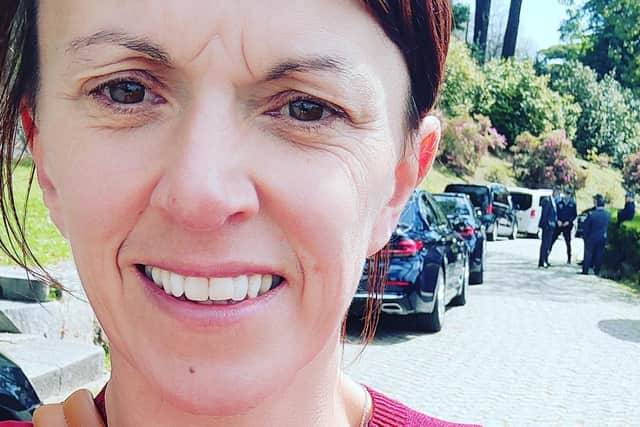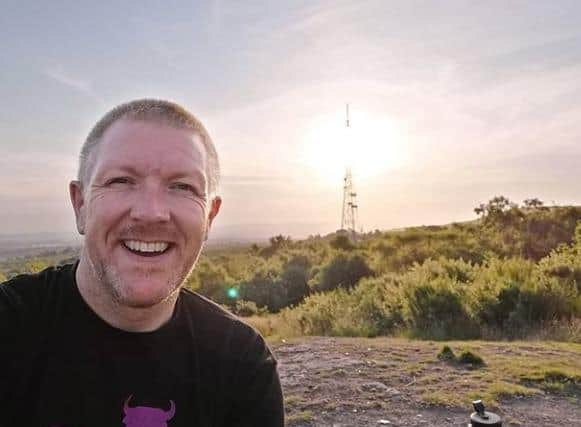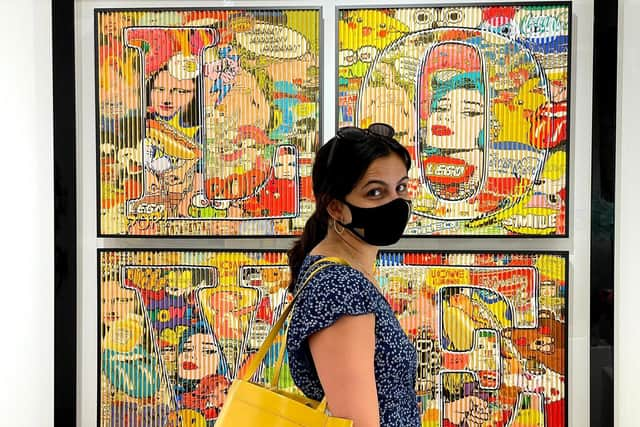Cost of Living: ‘We're definitely heading for a crisis’ - people across the world tell how rising prices have impacted
Spain: average wage £1,662 a month.
Stephanie Bungay, 44, from Edinburgh, lives in Almeria, Spain, where she works as a teacher.
She says: “When I moved here in 2018, whilst my wages were considerably lower than in the UK, I was able to live a comfortable life.
Advertisement
Hide AdAdvertisement
Hide Ad

“However, since the start of 2021, it has become more and more difficult to live off my salary and I consider myself to have a better wage than many in Spain. I do some additional private teaching, which I previously used for savings, but now that is part of my everyday living costs. I was hoping to save to go on a dream trip somewhere, like I used to do when I lived in the UK, but I don’t see that happening in the near future – I am keeping the savings I do have for future bills, because with daily/monthly rises in electricity, I worry at some point this year I am facing bills my salary won’t be able to support.
“It might sound like a nice problem, but from May the temperatures here mean air conditioning is a must in businesses, but they are paying nearly twice what they were last year. I am planning my summer work around when I can be in my air-conditioned office as I won’t be using it in my flat. There is some temporary support from the government, but it is not enough.
“I try to keep my outgoings as low as possible and thankfully as I am an active person the majority of what I do is outdoor sports which cost nothing. Hiking, cycling, paddle boarding (thankfully I bought my paddle board back in 2019 when times were better). I also play padel racquet and have a gym membership. For the moment I am allowing myself these two luxuries, but I am continually anxious about them and I know after summer I will have to review them.
“Last month I was planning a trip with friends and hiring the same car for the same length of time was €100 more than in November (not including fuel).


“Like in the UK, food has also gone up – I thought there had been a mistake at the supermarket a few months back when I did the exact same shop as always but it cost €17 more. I don’t buy treats, alcohol or meat, this is the basics of fruit, salad, pulses and yoghurt for one person. Costs are going to continue to rise and I am dreading what it will become by Christmas. I am not sure what I can cut back on, if anything.
“Nothing is safe from the price hike – even the daily ritual in Spain of tostada and café. This is a chance to get together with friends in a café and enjoy a cheap late breakfast and chat. However last week I went to one of my regular cafes and the same order cost €1.40 more. I have found myself saying no to more and more breakfasts and tapas invitations, which can be difficult when this is how socialising and friendship is done in Spain.
“I am by nature a positive person, but I am anxious about the cost of living, especially in a country that barely survived the 2008 crisis. I know there will be no salary increase, whilst costs will continue to go up.
“I have a single wage and rent in Spain is high. Living in a shared flat at 44 is not ideal, but it is the only way I can afford to live here. I don’t want to return to the UK, so I am looking at every way to make life in Spain more manageable. It will mean working more hours, and I’m hoping I wouldn’t have to find a second job, but it is a reality and a necessity to get through these times."


Cambodia: average wage $91 a month
Advertisement
Hide AdAdvertisement
Hide AdJohn McKellar, 44, from Perth, lives in Cambodia, where he is an aid worker.
He says the tourism industry in Cambodia, which the country relies heavily on, has not recovered from the Covid-19 pandemic.
He says: "The average person on the street here - the majority of them - is not earning as much money because of Covid. Tourism was massive here, this town is normally jumping all year round. The Angkor Wat Temples, where I cycle a couple of times a week, are so quiet. The locals are saying the difference in the numbers is extraordinary.


“The problem is, most of the people here rely on tourism for their livelihood. All the hotels and resorts have been closed for two years and even for me, going to look for apartments, they are half the price they would normally be. Tuk tuk drivers are saying the taxi ranks are ripping them off, so it's quite tough. Slowly but surely, after Chinese new year in April, things are starting to fill up again. At work, we are having to budget for the rising cost of living, inflation and fuel prices.
“People are worried because the cost of living has gone up – everything is more expensive - fuel prices are going up, but tourism still isn't back, so people aren’t making money like they used to. A lot of people are looking for new jobs. Before Covid, people used to just jump over the border to Thailand and Laos and Vietnam and work, but they can't do that either. So it is pretty grim and there's a lot of frustration.”
Romania: average wage £722 a month.
Dani Dijmarescu, 37, an IT worker, is from Cluj-Napoca, Romania, where he lives with his partner and three-year-old son.
An artificial spike in the price of petrol in March, caused by a rumour the price of fuel was going to double overnight, sparked a rush on pumps across Romania. It has since stabilised, but prices are still almost double the previous level, at around 7 lei (£1.30) a litre.
"Everything is a lot more expensive, starting with the gas [petrol] prices, which are basically ridiculous at this point,” he says. “It was unreal [when the rush happened]. There were unbelievable lines at all the gas stations. On the news, they were saying that there was no need to panic, that we have reserves, we're okay. They told us it's going to be a little more expensive, but possibly only a few bani, but no one nobody believed that. Some people were putting gas inside plastic bags and got fined for transporting gas in inappropriate conditions.
Advertisement
Hide AdAdvertisement
Hide Ad"You go to the grocery store and you pay 250 lei (£40) and you've just got some stuff lying on the bottom of the basket and that's it. They have given us a raise in wages, but I don't think it's going to cover it by a long shot. We're definitely heading for a crisis. And I think there's going to be some kind of induced recession when it comes to apartment prices - the bank is going to have to step in and take some measures.
"We've got some land in the countryside and we were planning on building a little cabin over there, but that's definitely off the table now, as the cost of construction materials have risen so much – the prices are absolutely insane. We don’t want to get into debt now, especially when we don’t know how this whole thing is going to turn out.
"I know I am lucky in my situation, but I am seeing a lot more requests from charities on social media for donations for older people living in the countryside, just to help them buy groceries, or afford medicines. They have to pay a proportion of their medication to the state and the cost of things like heart drugs is really high and they are on very small pensions. My friends and I are trying to help orphanages, which have been really badly hit by the rising prices.”
US: average wage £3,679 a month.
Katie Pineau, 26, a strategy consultant, lives in Washington DC.
“I notice the increases in price in all different types of shops. Whole Foods is the organic, expensive supermarket you always know you're going to spend more money than you had to – but now even in the supposedly affordable places like Trader Joe's, I look at the tally and it'll be much more than I expected. I live next to a coffee shop and they put out a sign recently saying they're raising all their coffee prices by a whole dollar, which feels like a big increase.
"I don’t have a car as I live in the city, though a lot of people are talking on social media about the increase in gas prices. Public transit costs have stayed the same because they're trying to get people back after the pandemic. But Lyft and Uber are adding surcharges that they'll notify you about due to rising gas prices. There’s a message when you book telling you there’s an extra $1.50 added to this to cover the cost of energy inflation.
"It is making people do things differently. Some friends are in the position of opting out of group dinners recently. They’ll say they’ll just eat whatever leftovers they have and meet for drinks after, which totally makes sense and everyone completely understands, but it feels like it's been more than usual. During the pandemic, spending had slowed down, because you didn’t have all of the expenses of going out and that kind of stuff, but people I think now are feeling like the pendulum is swinging the other way.”
All average wage information has been taken from data published by the World Bank. The average monthly salary in the UK is £2,379.
Comments
Want to join the conversation? Please or to comment on this article.